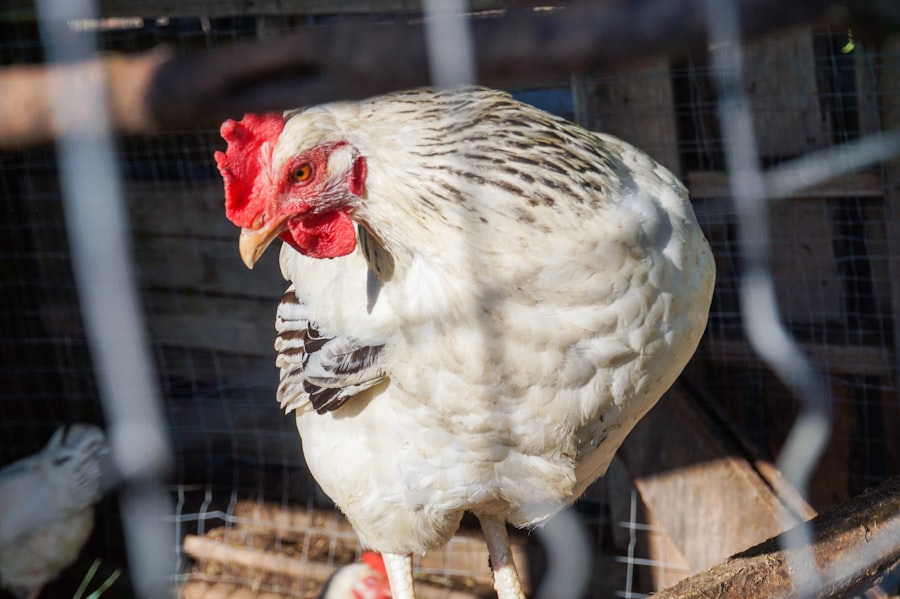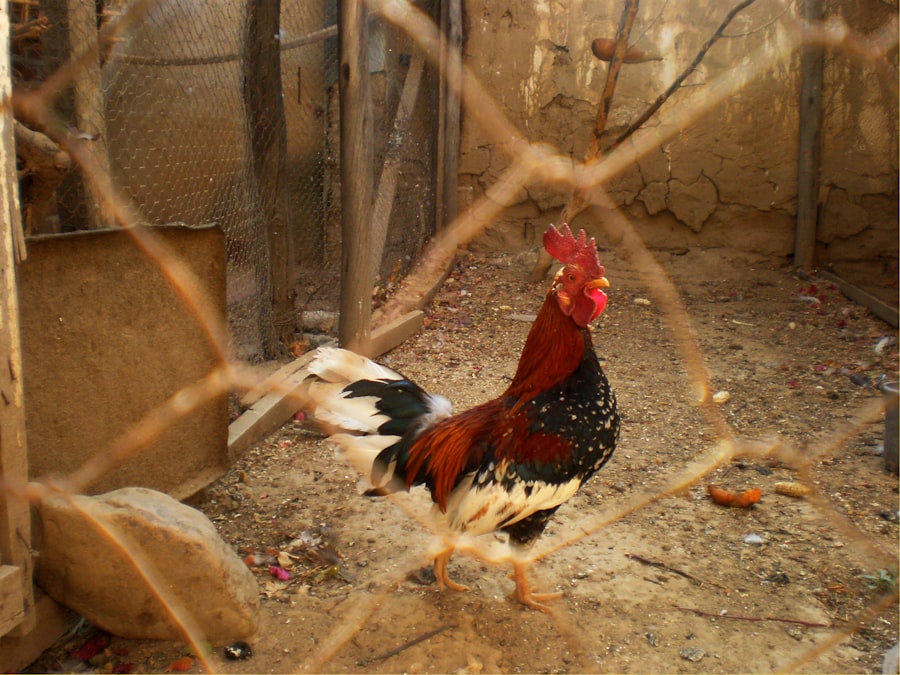Free range chickens exhibit natural behaviors that reflect their instincts and social nature. These birds are inquisitive and active, enjoying exploration of their environment. They are gregarious animals that benefit from interaction with other chickens.
Comprehending their behavioral patterns is essential for creating an appropriate habitat in a backyard setting. Typical behaviors of free range chickens include foraging for food, scratching the ground, and engaging in dust baths. They also possess an innate drive to roost at night and seek secluded areas for egg-laying.
By accommodating these natural tendencies, caretakers can design spaces that promote the chickens’ well-being while ensuring their safety. Free range chickens often display territorial behavior and establish a social hierarchy within their flock, commonly referred to as a pecking order. This can lead to aggressive interactions, particularly concerning access to food and nesting areas.
To mitigate potential conflicts, it is crucial to provide sufficient space, multiple nesting boxes, and adequate feeding stations for all members of the flock. A thorough understanding of free range chicken behavior is fundamental to creating an environment that supports their natural instincts and promotes their overall health and contentment in a backyard setting.
Table of Contents
- 1 Establishing Boundaries with Fencing and Barriers
- 2 Providing Adequate Food and Water in Your Yard
- 3 Implementing Natural Deterrents to Keep Chickens Away
- 4 Training and Supervising Your Chickens
- 5 Communicating with Your Neighbors
- 6 Seeking Legal Advice if Necessary
- 7 FAQs
- 7.1 What are some effective ways to keep free range chickens out of a neighbor’s yard?
- 7.2 Is it legal to keep free range chickens in a residential area?
- 7.3 What are the potential consequences of free range chickens entering a neighbor’s yard?
- 7.4 How can I communicate with my neighbor about keeping free range chickens out of their yard?
- 7.5 Are there any natural deterrents that can be used to keep free range chickens out of a neighbor’s yard?
Key Takeaways
- Free range chickens exhibit natural behaviors such as scratching, pecking, and dust bathing
- Fencing and barriers can help establish boundaries and protect gardens from chicken damage
- Providing adequate food and water sources in the yard can help keep chickens from wandering
- Natural deterrents such as predator decoys and motion-activated sprinklers can help keep chickens away from certain areas
- Training and supervising chickens can help reinforce boundaries and prevent unwanted behavior
- Communicating with neighbors about your chickens and addressing any concerns can help maintain good relationships
- Seeking legal advice may be necessary if conflicts with neighbors arise regarding free range chickens
Establishing Boundaries with Fencing and Barriers
Fencing and Barriers: The First Line of Defense
When it comes to keeping free range chickens in your yard, establishing boundaries is crucial. Fencing and barriers can help keep the chickens within a designated area while also protecting them from potential predators. It’s important to choose a sturdy and secure fencing material that can withstand the natural behaviors of chickens, such as scratching and pecking.
Height and Natural Barriers: Additional Protection
The fencing should be tall enough to prevent the chickens from flying over and escaping into neighboring properties. In addition to fencing, barriers such as hedges or shrubs can also help define the boundaries of the chicken’s roaming area. These natural barriers can provide additional protection and privacy for the chickens while also adding aesthetic value to your yard.
Considering Yard Size and Chicken Population
When establishing boundaries with fencing and barriers, it’s important to consider the size of your yard and the number of chickens you have. Providing enough space for the chickens to roam while also keeping them contained is essential for their well-being and safety.
Providing Adequate Food and Water in Your Yard

Free range chickens rely on foraging for a significant portion of their diet, but it’s still important to provide them with adequate food and water in your yard. A balanced diet is essential for their overall health and well-being. This can include a combination of commercial chicken feed, grains, fruits, vegetables, and kitchen scraps.
It’s important to provide a variety of food options to ensure that the chickens are getting all the necessary nutrients they need. In addition to food, access to clean and fresh water is crucial for free range chickens. They need constant access to water for drinking and regulating their body temperature, especially during hot weather.
It’s important to provide multiple water sources throughout your yard to ensure that all the chickens have access to water at all times. Additionally, keeping the water clean and free from contaminants is essential for preventing any potential health issues among the flock. Overall, providing adequate food and water in your yard is essential for the health and well-being of free range chickens.
Implementing Natural Deterrents to Keep Chickens Away
While free range chickens are a joy to have in your yard, there may be certain areas or plants that you want to keep them away from. Implementing natural deterrents can help discourage the chickens from accessing these areas without causing them any harm. For example, using chicken wire or netting can help protect specific garden beds or plants from being damaged by the chickens’ natural foraging behavior.
Additionally, using natural repellents such as citrus peels or strong-smelling herbs can help deter the chickens from certain areas of your yard. Another natural deterrent is the use of physical barriers such as low fences or planters to block off specific areas from the chickens’ access. These barriers can help define boundaries within your yard and prevent the chickens from entering areas where they may cause damage.
Overall, implementing natural deterrents is a gentle way to guide the chickens away from certain areas while still allowing them to roam freely in most parts of your yard.
Training and Supervising Your Chickens
Training and supervising free range chickens can help ensure that they behave appropriately in your yard. While chickens have natural instincts, they can still be trained to respond to certain cues and commands. For example, you can train them to return to their coop at a specific time each day by using treats or a consistent routine.
Additionally, supervising the chickens while they are out in the yard can help prevent any potential issues such as aggressive behavior or damage to plants. Supervision also allows you to observe their behavior and address any potential concerns before they escalate. By spending time with the chickens in your yard, you can also build a bond with them and establish trust, which can make training easier.
Overall, training and supervising your free range chickens can help create a harmonious environment in your yard while also ensuring their safety and well-being.
Communicating with Your Neighbors

Preventing Conflicts and Misunderstandings
If you have free range chickens in your yard, it’s essential to communicate with your neighbors about your decision to keep them. This can help prevent any potential conflicts or misunderstandings regarding noise, odors, or property boundaries. By informing your neighbors about your plans to keep free range chickens, you can address any concerns they may have and work together to find solutions that benefit everyone.
Building Positive Relationships
Being open and transparent about your intentions can help build positive relationships with your neighbors. You can discuss any potential issues such as noise or odors and work together to find ways to minimize any impact on neighboring properties.
Fostering Community and Cooperation
Overall, communicating with your neighbors about your free range chickens can help foster a sense of community and cooperation in your neighborhood. By working together, you can create a harmonious and respectful living environment for everyone involved.
Seeking Legal Advice if Necessary
Before keeping free range chickens in your yard, it’s important to familiarize yourself with any local regulations or ordinances that may apply. Some areas may have specific rules regarding the number of chickens allowed, coop requirements, noise restrictions, or zoning laws. Seeking legal advice can help ensure that you are in compliance with any relevant laws or regulations before bringing chickens into your yard.
Additionally, legal advice can also help you understand your rights as a chicken owner and address any potential concerns that may arise with neighbors or local authorities. By being proactive and informed about the legal aspects of keeping free range chickens, you can avoid any potential legal issues in the future. Overall, seeking legal advice if necessary can help ensure that you are able to keep free range chickens in your yard in a responsible and lawful manner.
If you’re looking for more tips on keeping free range chickens contained, check out this article on 10 essential tips for building a chicken coop. It offers valuable advice on creating a secure and comfortable space for your chickens, which can help prevent them from wandering into your neighbor’s yard.
FAQs
What are some effective ways to keep free range chickens out of a neighbor’s yard?
Some effective ways to keep free range chickens out of a neighbor’s yard include installing a fence, using chicken wire or netting, using natural deterrents such as citrus peels or vinegar, and training the chickens to stay within a designated area.
Is it legal to keep free range chickens in a residential area?
Laws regarding keeping free range chickens in residential areas vary by location. It is important to check local ordinances and regulations to ensure compliance with any laws regarding keeping chickens in a residential area.
What are the potential consequences of free range chickens entering a neighbor’s yard?
Potential consequences of free range chickens entering a neighbor’s yard may include damage to the neighbor’s property, disturbance to the neighbor’s peace and quiet, and potential conflicts with the neighbor.
How can I communicate with my neighbor about keeping free range chickens out of their yard?
Open and respectful communication with your neighbor is key. Discuss the issue with your neighbor and work together to find a solution that works for both parties. This may involve implementing measures to keep the chickens out of the neighbor’s yard.
Are there any natural deterrents that can be used to keep free range chickens out of a neighbor’s yard?
Yes, natural deterrents such as citrus peels, vinegar, or certain plants can be used to discourage chickens from entering a neighbor’s yard. These natural deterrents can be effective in keeping chickens away without causing harm to the animals.
Meet Walter, the feathered-friend fanatic of Florida! Nestled in the sunshine state, Walter struts through life with his feathered companions, clucking his way to happiness. With a coop that’s fancier than a five-star hotel, he’s the Don Juan of the chicken world. When he’s not teaching his hens to do the cha-cha, you’ll find him in a heated debate with his prized rooster, Sir Clucks-a-Lot. Walter’s poultry passion is no yolk; he’s the sunny-side-up guy you never knew you needed in your flock of friends!







